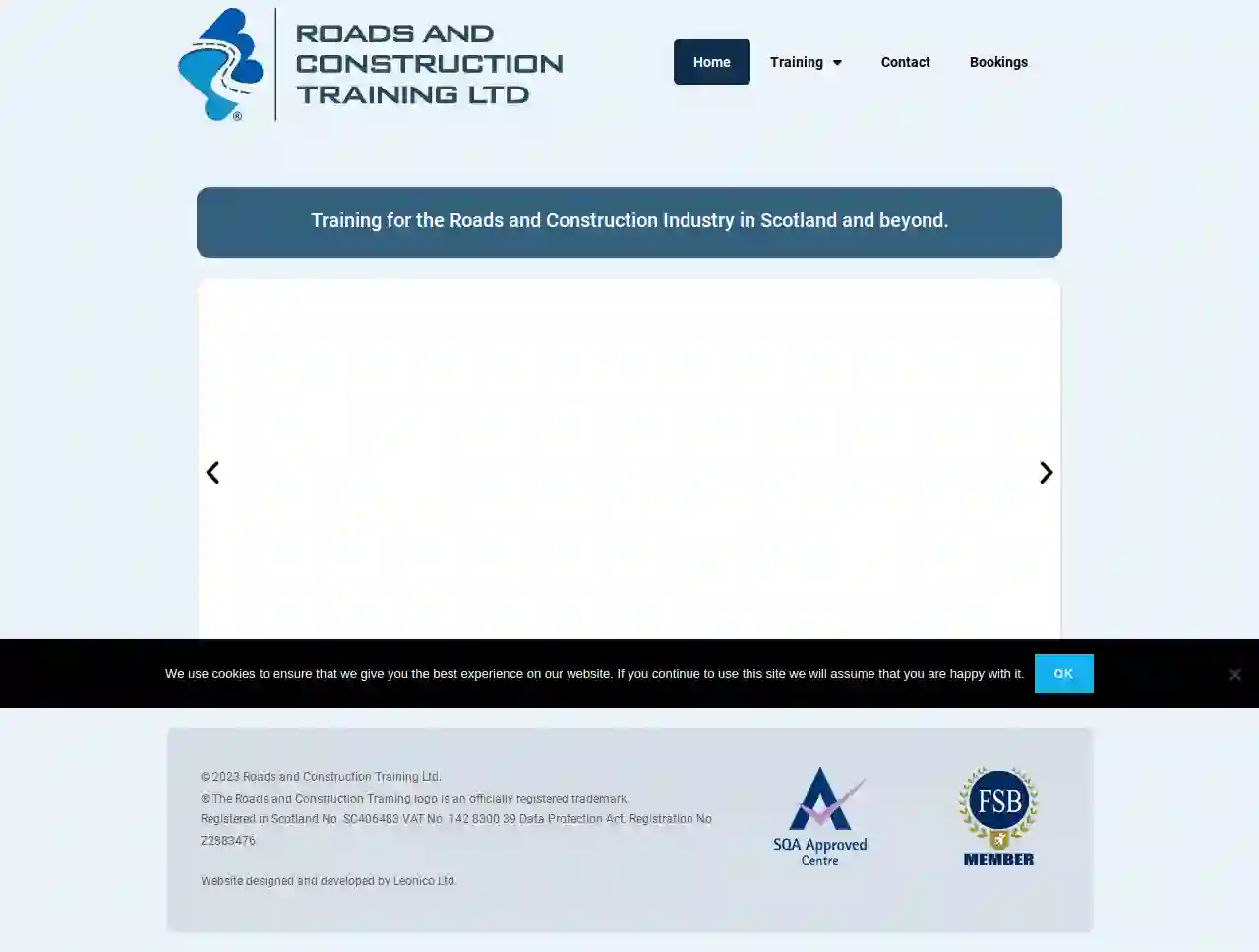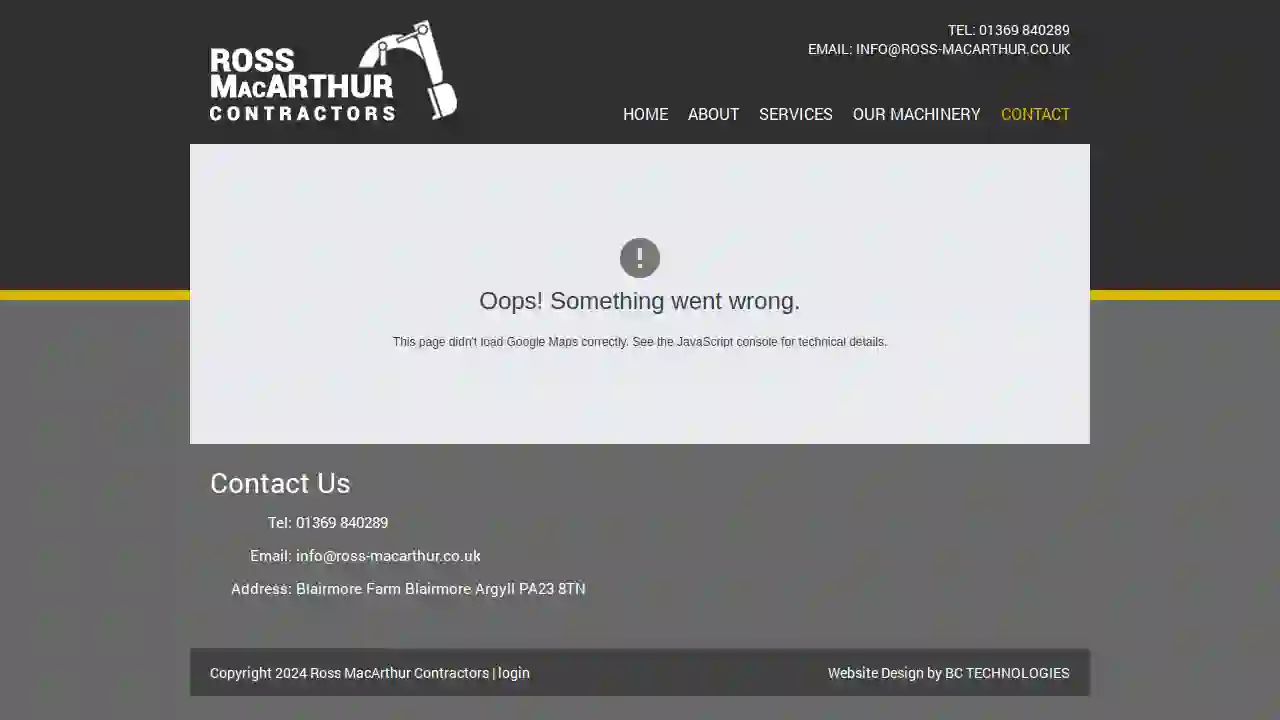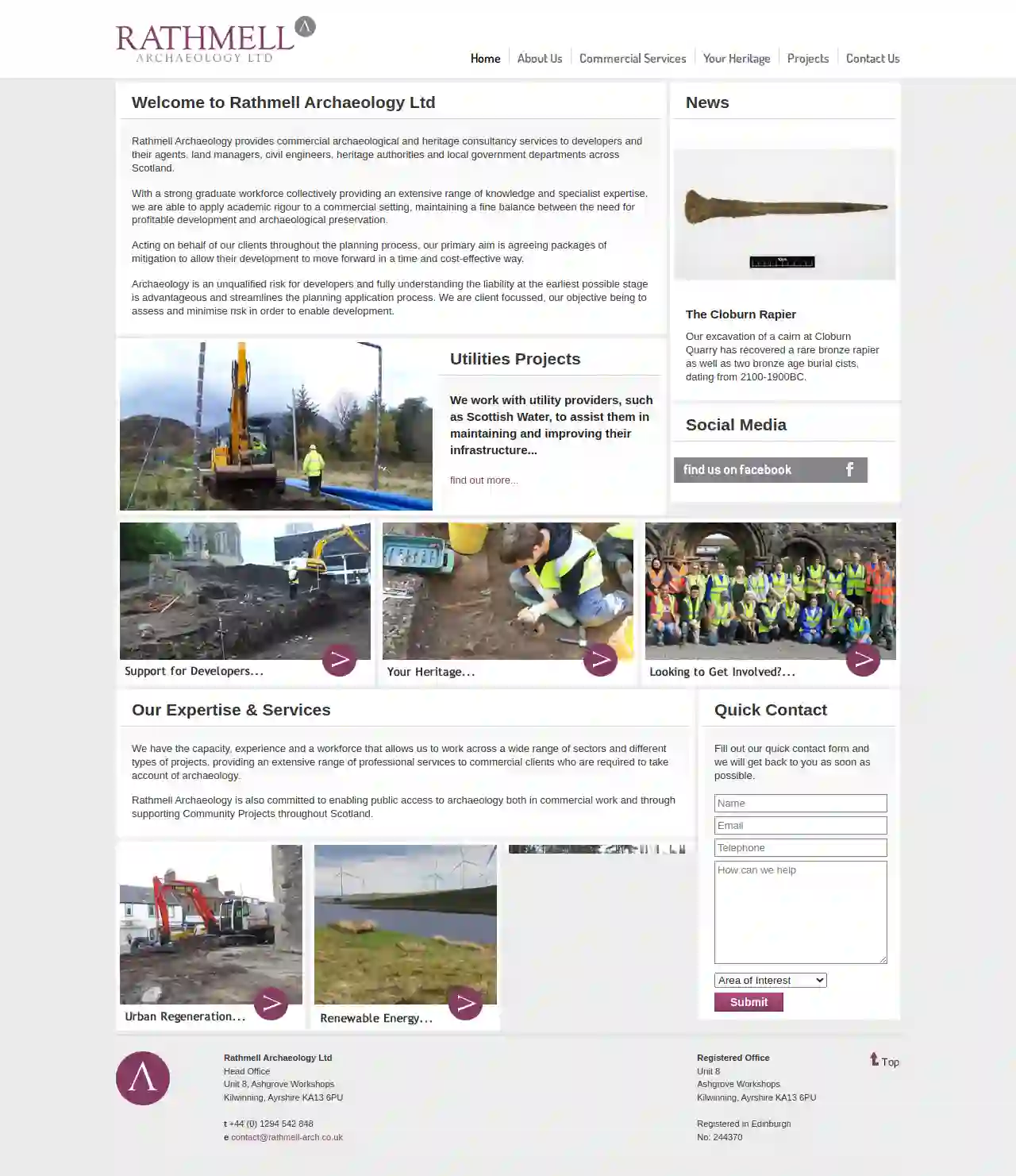Excavation Contractors Bonhill
Top 10 Excavation Companies in Bonhill
Get 3 FREE Excavation Companies quotes for your project today! Compare profiles, reviews, accreditations, portfolio, etc... and choose the best offer.

Roads and Construction Training Ltd
Glasgow, GBTraining for the Roads and Construction Industry in Scotland and beyond. Roads and Construction Training are a professionally run training organisation whose instructors are all experts within their own fields of operations, roadwork’s, construction and utilities sectors. Having been approved by the Awarding body SQA, we can provide an extensive range of highly recognised awards, all of which comply with The Government Legislative requirements of HSE and SQA, and The National Occupational Standards, also that of The National Specification Requirements for NRSWA and Codes of Practice associated within Roadwork’s Specifications for working on Roads, Highways.We are about “Taking the Training to the Client, not the Client to the Training”. On-Site Training and AssessmentEquipped to provide On-site training and assessment where required, our highly experienced and qualified staff are committed to providing a quality service where ever the need maybe. Nowadays within the Roads, Construction and Utilities Industries there has never been a greater demand for the Improvement of Standards and Quality of Workmanship to improve. Our highly recognised qualifications awarded and approved by SQA, are for all occupations within these Industries mentioned above, and are aimed at all levels from the most junior to the most senior these qualifications are for youth and adult learning, they are highly recognised for improving personnel skills, employability and career prospects and are about improving and putting the skills back into the industry. Our service shall meet the standards with a view to improving them and to ensure we are achieving the highest level of satisfaction for our clients.
- Services
- Why Us?
- Accreditations
- Gallery
Get Quote
Lindsay Construction (Scotland) Ltd
53 reviews65 Pitfairn Road, FishcrossAlloaClackmannanshire, 65 Pitfairn RoadFishcrossAlloaClackmannanshire, Alloa, FK10 3HU, GBAbout us and our services: Lindsay Construction was a NHBC Registered Building Contractor, however due to Covid 19 we decided not to renew our membership as we didn't anticipate building any new builds in 2021/22, however if you do wish us to quote to provide new build services, we can easily renew our membership to accommodate this. We cover Falkirk, Stirling, Stirlingshire, Alloa, Clackmannanshire, Fife and surrounding areas. All work carried out is fully guaranteed. We provide free advice and quotations. Established in 1993 we have been providing professional building services and have an enviable reputation for quality workmanship. Our concept is simple we supply high quality goods and services at low prices. It is obviously a winning combination as over the years we have built up a vast network of satisfied customers, which keep coming back, and also recommending us to friends and family, proving we are a company you can trust. Working closely with our clients throughout the project ensuring all expectations are met, our skilled team of craftsmen are courteous and ready to help realise your dreams. In short we deliver a quality, value for money, knowledgeable and expert service, attention to detail being our winning formula in this competitive market. We specialise in New Builds, Self builds for clients, House Extensions, Renovations and Modernisations, Loft and Garage Conversions, Property Maintenance and Repairs and Home improvements. We offer a wide range of kitchen and bathroom supply and fitting services, to provide our customers with a fully customised service. We also offer Mono bloc driveways and slabbing services, please see our gallery section for ideas. Our customers enjoy the benefits of our discounted Trade accounts with Local Businesses to name a few examples, Beatsons Building Supplies, Alloa Hire, Hamilton and Brydie, and Multi National Organisations, Jewsons, Magnet, Howdens, Plumbworld and much more, our savings are passed on. Please see our useful links page for more information. We are also registered as a VIP Velux installer partner.
- Services
- Why Us?
- Our Team
- Gallery
Get Quote
Drain Fix Solutions
4.961 reviewsGlasgow, GBAbout Us We are a locally owned business covering Glasgow and the West with over 8 years experience in the drainage industry. All our staff are fully trained and qualified so you know you are in the best hands when it comes to your drainage issues. We have probably dealt with every drainage problem imaginable so there’s not an issue too small or big. Our phone lines are operational 24/7 so you can call us anytime to book in your appointment. We specialise in all aspects of Domestic and Commercial Drainage issues and aim to carry out the works as quickly and efficiently as possible meaning less disruption for our customers. We offer a mix of fixed pricing and job rates for our services and all works are explained to you prior to commencement to ensure you are aware of what the job entails and the cost before starting. Please click on one of our services to find out more.
- Services
- Why Us?
- Testimonials
- Gallery
Get Quote
LD Home Improvements
Glasgow, GBAt LD Home Improvements, we pride ourselves on being Glasgow's premier choice for comprehensive home renovation and improvement services. With a passion for transforming spaces and a commitment to excellence, we offer a wide range of services designed to meet all your home improvement needs. Based in the heart of Glasgow, LD Home Improvements is a team of skilled professionals dedicated to delivering high-quality workmanship and exceptional customer service. Our expertise spans multiple areas of home improvement, ensuring that we can handle any project, big or small, with precision and care. Our Values Quality Workmanship: Delivering high standards in every project we undertake. Customer Satisfaction: Ensuring our clients are happy with our services through open communication and personalized solutions. Competitive Pricing: Offering transparent and fair pricing to provide excellent value for your investment.
- Services
- Why Us?
- Gallery
Get Quote
Class One Traffic Management
Class One House, Seabegs Road, Class One HouseSeabegs RoadBonnybridge, Bonnybridge, FK4 2AQ, GBAbout Class One TM For 30 years, Class One Traffic Management has been keeping Scotland’s road workers and road users safe by providing professional traffic management services. We work with clients in Highways, Local Authorities, Utilities, Rail and Events to ensure their workers can carry out their duties in a safe work zone. Why Choose Us Class One Traffic Management provides a professional, first-class service on all aspects of their works. They have successfully delivered numerous projects for us over a long period of time. Class One holds a “preferred” status with us, less than 2.5% of our total supply chain have received this accolade. Accreditations Class One Traffic Management is fully accredited and insured, ensuring that our clients can be confident in our ability to deliver a safe and efficient service. Health & Safety We are committed to providing a safe working environment for our employees and the public. We have a comprehensive health and safety policy in place and we are constantly striving to improve our safety performance. Case Studies We have a proven track record of delivering successful traffic management projects. Our case studies demonstrate our ability to work effectively with our clients to achieve their objectives.
- Services
- Why Us?
- Testimonials
- Gallery
Get Quote
EK, East Kilbride
3.9300 Cornwall Street East Kilbride, East Kilbride, G74 1LL, GBEast Kilbride Shopping Centre: Your One-Stop Shop for Shopping, Dining, and Entertainment Discover the largest undercover shopping and leisure destination in Scotland, offering a diverse range of shops, restaurants, and entertainment options. From fashion and homeware to dining and leisure, EK has something for everyone. Explore our wide selection of stores, enjoy delicious meals at our restaurants, and catch the latest movies at our state-of-the-art cinema. With convenient parking and a welcoming atmosphere, EK is the perfect place to spend a day out with friends and family. Stay up-to-date with the latest news, events, and offers by subscribing to our newsletter. We're always adding new stores and experiences, so be sure to check back often.
- Services
- Why Us?
- Gallery
Get Quote
Dow Group Ltd
4.788 reviews23 Lenziemill Road, Cumbernauld, G67 2RL, GBA waste management, Skip hire and aggregates business based in Scotland. Dow Group UK is utterly dedicated to sustainability. Dow cares. Do you? You care about your environment. And so do we. It is at the heart of everything we do. Yes we’re a waste management company. We collect, sort and recycle household and commercial rubbish. But it’s what we do with it next that marks us out from our competitors. Every year thousands of tonnes are shipped to power people’s homes. The stuff you throw away is being re-used. By trusting Dow's services you'll be playing a small part in combating climate change. This makes you happy...and us proud. Discover DOW Group’s other services.
- Services
- Why Us?
- Testimonials
- Gallery
Get Quote
Ross Macarthur Contractor Ltd
53 reviewsBlairmore Farm, Blairmore Argyll, Blairmore Farm Blairmore Argyll, Dunoon, PA23 8TN, GBAbout Ross MacArthur Contractors Ross MacArthur Contractors is a building and general contracting business based near Dunoon, in Argyll, Scotland. We undertake a mixed portfolio of civil works in the public and private sectors, from individual clients seeking to build or improve their own property right up to large-scale organisations that require support for their construction projects. Our History Ross MacArthur set up in business in 2003 as a sole trader. He hired out plant and equipment and undertook small agricultural contracting jobs himself, all from his base at Blairmore Farm. The business grew steadily, as, through word of mouth, Ross built a reputation for quality contracting work and hassle-free plant-hire. He soon branched out into construction work and gradually assembled a team of skilled plant operators and manual labourers, able to tackle jobs as diverse as sea wall protection, cable and pipe laying, road repairs and emergency remedial work for the energy industry. Our Growth By 2013 the business had grown to such an extent that the decision was made to create a limited company, Ross MacArthur Contractors Limited, which is solely owned by Ross himself. A separate but associated company, Ross MacArthur Plant Hire Limited, was created at the same time. Our Services Ross MacArthur Contractor Ltd has a fleet of around 15 machines available for hire on a short- or medium/longer-term basis, capable of tackling a wide range of specialist and general contracting duties. These vehicles can be supplied with fully certified, skilled operators who are adept at working in the often difficult terrain and frequently challenging weather conditions, which are characteristic of the Argyll and Bute region. Our Commitment We pride ourselves on providing a friendly, professional, customer-focussed service. So if you’re looking for plant or machinery hire or help with a building or contracting job, we would love to hear from you. We are more than happy to answer any queries or to discuss your project.
- Services
- Why Us?
- Gallery
Get Quote
EA Construction Scotland Ltd
North Letham Farm, Letham, FK2 8QU, GBEA Construction: Your Trusted Groundwork and Civil Engineering Partner in Scotland EA Construction Scotland Ltd has established a strong reputation for delivering professional and efficient groundwork and civil engineering services. We are committed to providing exceptional quality and exceeding client expectations on every project, big or small. Our team of highly skilled professionals possesses extensive experience in a wide range of projects, including housing infrastructure, roads & sewers, land drainage, hard and soft landscaping, earthworks, and minor civil engineering. Since 2009, we have consistently provided engineering and utility services to a diverse clientele across Scotland, encompassing both private and public sectors. Our extensive project portfolio reflects our dedication to delivering all contracts safely, on schedule, and within budget, while ensuring value for money. We are committed to developing long-term business relationships and strive for repeat business by offering added value through innovative engineering excellence and exceptional service quality. Our commitment to sustainability is evident in our dedication to safeguarding all stakeholders, including the health and safety of our employees, the environment, and society as a whole.
- Services
- Why Us?
- Testimonials
- Gallery
Get Quote
Rathmell Archaeology Ltd
52 reviewsUnit 8, Ashgrove Workshops, Kilwinning, KA13 6PU, GBWelcome to Rathmell Archaeology Ltd Rathmell Archaeology provides commercial archaeological and heritage consultancy services to developers and their agents, land managers, civil engineers, heritage authorities and local government departments across Scotland. With a strong graduate workforce collectively providing an extensive range of knowledge and specialist expertise, we are able to apply academic rigour to a commercial setting, maintaining a fine balance between the need for profitable development and archaeological preservation. Acting on behalf of our clients throughout the planning process, our primary aim is agreeing packages of mitigation to allow their development to move forward in a time and cost-effective way. Archaeology is an unqualified risk for developers and fully understanding the liability at the earliest possible stage is advantageous and streamlines the planning application process. We are client focussed, our objective being to assess and minimise risk in order to enable development. Rathmell Archaeology is also committed to enabling public access to archaeology both in commercial work and through supporting Community Projects throughout Scotland.
- Services
- Why Us?
- Gallery
Get Quote
Over 13,059+ Excavation Contractors in our network
Our excavation contractors operate in Bonhill & surrounding areas!
ExcavationHQ has curated and vetted the Best Excavation Contractors in and around Bonhill. Find the most trustworthy pro today.
Frequently Asked Questions About Excavation Contractors
- Clearly Define the Scope: Outline the project's goals, including the excavation area, depth, grade, and intended use.
- Obtain Necessary Permits: Research and acquire any required permits from your local authorities.
- Mark Utility Lines: Contact your utility companies to locate and mark underground utilities to prevent damage.
- Communicate with Neighbors: Inform your neighbors about the project's timeline and potential noise or disruptions.
- Prepare the Site: Clear any obstacles, such as vegetation, furniture, or structures, from the excavation area.
- Discuss Safety Protocols: Review safety procedures with the contractor to ensure a safe work environment.
- Project Type and Size: Ensure the contractor has experience handling projects similar to yours in scale and complexity.
- Reputation and Reviews: Check online reviews and testimonials, and request references from previous clients.
- Licensing and Insurance: Verify that the contractor is properly licensed and insured to protect you from liability.
- Equipment and Resources: Confirm that they have the necessary equipment and resources for your project's needs.
- Communication and Transparency: Choose a contractor who communicates clearly, provides detailed estimates, and keeps you informed throughout the project.
- Safety Record: Inquire about their safety protocols and track record to ensure a safe work environment.
- Price: While price is important, it shouldn't be the only deciding factor. Balance affordability with experience, reputation, and quality of service.
- Trench Collapses: Unstable trench walls can cave in, posing a severe risk to workers. Proper shoring and sloping are crucial safety measures.
- Utility Damage: Striking underground utilities (gas, water, electric) can cause leaks, explosions, or electrocution. Accurate utility locates and careful digging are essential.
- Falling Objects: Materials or equipment falling into excavations can injure workers. Securing work areas and using appropriate safety gear is vital.
- Equipment Accidents: Operating heavy machinery involves risks of rollovers, collisions, or mechanical failures. Trained operators and proper equipment maintenance are critical.
- Environmental Hazards: Excavated soil might contain hazardous materials (asbestos, lead). Proper testing and disposal procedures are necessary.
- Excavations Deeper Than a Certain Depth: This varies by jurisdiction, usually around 5 feet.
- Excavations Near Utilities: Digging near buried utilities (gas, water, electric) often requires permits and utility locates to prevent damage.
- Excavations Affecting Public Property: Projects impacting sidewalks, roads, or other public areas typically require permits.
- Excavations in Environmentally Sensitive Areas: Projects in wetlands, floodplains, or other sensitive areas might need special permits.
What should I do before excavation starts?
How do I choose the right excavation contractor for my project?
What are the risks associated with excavation?
Do I need a permit for excavation?
What should I do before excavation starts?
- Clearly Define the Scope: Outline the project's goals, including the excavation area, depth, grade, and intended use.
- Obtain Necessary Permits: Research and acquire any required permits from your local authorities.
- Mark Utility Lines: Contact your utility companies to locate and mark underground utilities to prevent damage.
- Communicate with Neighbors: Inform your neighbors about the project's timeline and potential noise or disruptions.
- Prepare the Site: Clear any obstacles, such as vegetation, furniture, or structures, from the excavation area.
- Discuss Safety Protocols: Review safety procedures with the contractor to ensure a safe work environment.
How do I choose the right excavation contractor for my project?
- Project Type and Size: Ensure the contractor has experience handling projects similar to yours in scale and complexity.
- Reputation and Reviews: Check online reviews and testimonials, and request references from previous clients.
- Licensing and Insurance: Verify that the contractor is properly licensed and insured to protect you from liability.
- Equipment and Resources: Confirm that they have the necessary equipment and resources for your project's needs.
- Communication and Transparency: Choose a contractor who communicates clearly, provides detailed estimates, and keeps you informed throughout the project.
- Safety Record: Inquire about their safety protocols and track record to ensure a safe work environment.
- Price: While price is important, it shouldn't be the only deciding factor. Balance affordability with experience, reputation, and quality of service.
What are the risks associated with excavation?
- Trench Collapses: Unstable trench walls can cave in, posing a severe risk to workers. Proper shoring and sloping are crucial safety measures.
- Utility Damage: Striking underground utilities (gas, water, electric) can cause leaks, explosions, or electrocution. Accurate utility locates and careful digging are essential.
- Falling Objects: Materials or equipment falling into excavations can injure workers. Securing work areas and using appropriate safety gear is vital.
- Equipment Accidents: Operating heavy machinery involves risks of rollovers, collisions, or mechanical failures. Trained operators and proper equipment maintenance are critical.
- Environmental Hazards: Excavated soil might contain hazardous materials (asbestos, lead). Proper testing and disposal procedures are necessary.
Do I need a permit for excavation?
- Excavations Deeper Than a Certain Depth: This varies by jurisdiction, usually around 5 feet.
- Excavations Near Utilities: Digging near buried utilities (gas, water, electric) often requires permits and utility locates to prevent damage.
- Excavations Affecting Public Property: Projects impacting sidewalks, roads, or other public areas typically require permits.
- Excavations in Environmentally Sensitive Areas: Projects in wetlands, floodplains, or other sensitive areas might need special permits.